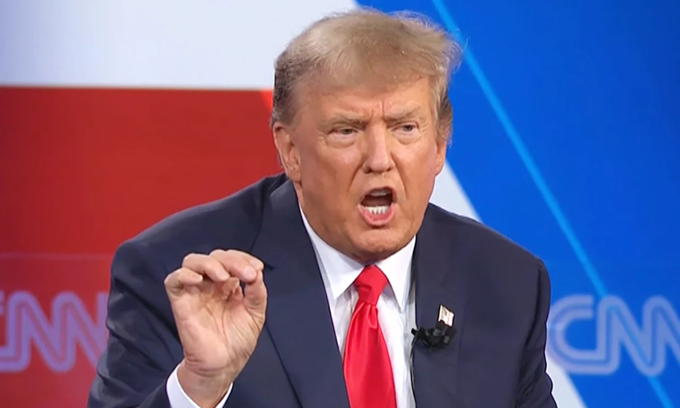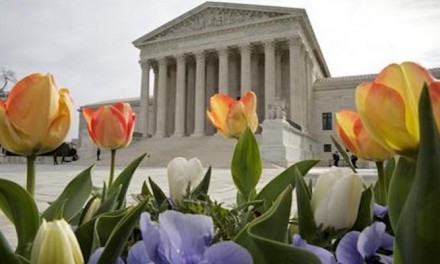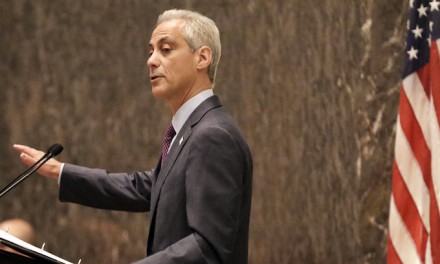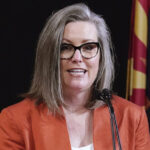Former President Donald Trump on Saturday won handily in three states over the weekend, which awarded even more delegates for the GOP presidential nomination.
Idaho and Missouri conducted primary elections, with President Trump taking the majority of the two states’ delegates. In Michigan, Republicans at a Grand Rapids convention awarded the former president all the delegates that could be allocated, which is in addition to the 12 at-large delegates he won last week in the primary.
For Idaho, it was projected that President Trump won all 32 delegates the state could offer. After Michigan’s contest, the he won 54.
Notably, President Trump took 68 percent of the vote compared with former U.S. Ambassador to the U.N. Nikki Haley’s 27 percent in Michigan, according to Reuters.
Pete Hoekstra, the Michigan Republican Party’s chair, called his win an “overwhelming, dominating victory.”
The result was even more stark in Idaho. The 45 president took home about 84 percent of the primary vote, compared to Ms. Haley’s 13 percent. Florida Gov. Ron DeSantis got more than 1 percent despite having dropped out and endorsed President Trump months ago.
It means that President Trump now has 244 delegates. Ms. Haley, the former president’s only primary challenger, only has 24 so far, meaning that the former president has more than 10 times her delegate count.
A candidate needs to secure 1,215 delegates to receive the Republican presidential nomination.
There were no caucuses for Democrats on Saturday.
With victories in Iowa, New Hampshire, the U.S. Virgin Islands, South Carolina, and now Michigan, Missouri, and Idaho under his belt, President Trump is far and away the frontrunner in the race, with Ms. Haley hanging on thanks to support from mostly anti-Trump donors. In Nevada, where the former president didn’t appear on the ballot, voters overwhelmingly chose “none over the above” instead of Ms. Haley or any other GOP candidate.
It also suggests that Ms. Haley is quickly running out of time to erase her deficit in the Republican nominating race. But she has vowed to stay in the race until after the Super Tuesday contest—even after suffering defeats in every state so far.
The next event on the Republican calendar in the District of Columbia. Two days after that, is Super Tuesday, one of the most important days of the 2024 election calendar.
On that day, March 5, 16 states will hold primaries, and analysts say that President Trump is on track to lock up the nomination just a few days days later.
Reactions
While President Trump did not publicly comment on the Saturday elections, Ms. Haley appeared to go on the offensive on Sunday.
During a campaign event on Sunday, the former South Carolina governor claimed that the former president’s campaign threatened people in Washington, D.C., for not voting for him. She was reacting to a Politico report, citing an unnamed alleged Trump official, claiming that the Trump campaign would track people and how they voted in the district.
“That’s not how you win an election,” she told reporters. “This is about candidates wanting people to come into their fold, not threatening them, not pushing them out of their club. Is that what we want as a leader? The majority of these people will tell you no, they’re done with that.”
In recent days, Ms. Haley has ramped up her rhetoric as she struggles to gain traction against her former boss.
Also on Sunday, the former ambassador said that she is no longer bound by Republican National Committee (RNC) pledge to endorse the President Trump if he wins the nomination.
During an NBC interview, moderator Kristin Welker asked Ms. Haley: “So you’re no longer bound by that pledge?”
“No, I think I’ll make what decision I want to make, but that’s not something I’m thinking about,” she said, adding that “if you talk about an endorsement, you’re talking about a loss. I don’t think like that.”
She continued: “When you’re in a race, you don’t think about losing. You think about continuing to go forward.” Later on, Ms. Haley criticized the RNC and asserted that the organization “is no longer the same RNC” and is “now Trump’s RNC.”
Meanwhile, Trump campaign officials have suggested that Ms. Haley drop out. “She can’t name one state she can win, let alone be competitive in,” spokesperson Steven Cheung said in a recent statement to news outlets.
As for the former president himself, on Saturday, he told to a North Carolina crowd that Ms. Haley is similar to former Speaker Nancy Pelosi (D-Calif.). “I put them in because they’re interchangeable in my mind,” he said. “Except I have to say, I shouldn’t say this about a semi-Republican, but I think Pelosi’s probably a little bit smarter, actually.”
Reuters contributed to this report.



















Haley may as well pack it up now.
Remember 2020 and maneuvers GOP (President Trump) set in motion before Nov 7th in case he lost has me wondering, what’s he crafted this go round. Not saying he’s going to lose but, my wish is that the crowd remain in DC if another coup attempt is executed. Scary just thinking about crowds of confederate flag waving, swastika tattooed, AR-15 carrying masses start tearing up stuff in other areas of the country.
WHY IS IT when ever you speak of trump supporters, you seem to envision Neo-nazi, gestapo like folks?? YOu seem to have that vision on the brain so much, i wonder, why??